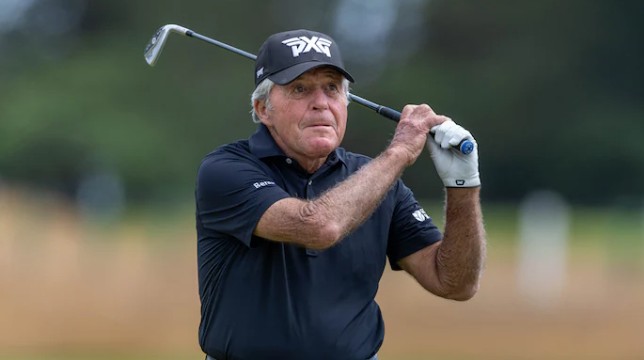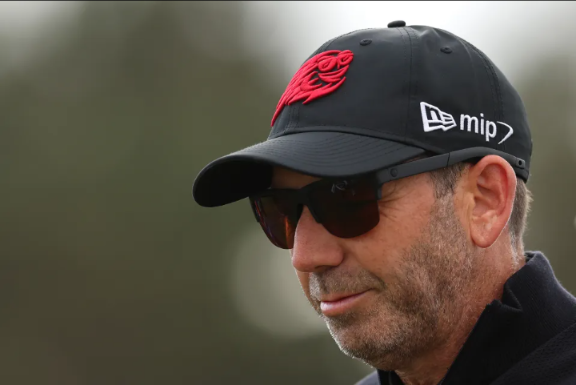‘I Think We’re in Trouble’: Is There a Future for MAGA After Trump?
Scenes from Trump country in Arizona are pictured. What would become of MAGA when former President Donald Trump is gone? If Republicans anywhere have an answer, it should be here. David Siders is a politics editor at POLITICO. He previously was a national political correspondent at POLITICO and a senior writer for The Sacramento Bee….
Scenes from Trump country in Arizona are pictured. What would become of MAGA when former President Donald Trump is gone? If Republicans anywhere have an answer, it should be here.
David Siders is a politics editor at POLITICO. He previously was a national political correspondent at POLITICO and a senior writer for The Sacramento Bee.
TEMPE, Arizona — The tailgate was aimed at boosting a protégé, but it was Donald Trump whose name and image were plastered everywhere — on the banner hung from Republicans’ table outside the Arizona State University football game, on baseball caps, on signs they carried and stickers they fixed to tank-tops on a Friday night where the pavement was still hot and the temperature, at dusk, hovered around 95 degrees.
They might have turned out to support the protégé, Kari Lake, but it was his movement — Trump’s — that the tailgaters were starting to worry about.
What would become of MAGA when Trump — either in four years if he wins the presidency again or sooner if he loses — is gone? Could someone else replace him?
“I’ve often wondered that,” said Terri Seiber, who sat beside me on the curb in front of two porta potties, a Trump-Vance yard sign in the dark beside her. “We don’t have anybody in the Republican Party who’s even close.”
Not Lake, she said. “No, I don’t think so.” Seiber had seen her collapse in the gubernatorial race two years ago and knew she was running behind her Democratic opponent in the Senate contest, now, too.
Not JD Vance, Trump’s running mate. “No. He sounds like a real great guy. But Trump, he’s just got that oomph about him.”
Who else?
“It does make me worry,” she told me. “The movement is mostly him.”
I’d come to Arizona to ask not about the presidential contest that culminates Tuesday but about what will happen after that, about the post-Trump future of MAGA. If Republicans anywhere have an answer, it should be here. For all its history of electing iconoclasts — politicians like Barry Goldwater and John McCain, but also Kyrsten Sinema and Jeff Flake — Arizona has also seen them run their course.
In the MAGA era, there are few states where Republicans have remade themselves so completely in service to the cause. Arizona was the site, not far from Lake’s tailgate, of the farcical “audit” of the 2020 election and provided a border-state backdrop for Trump’s nativist, anti-migrant rhetoric. Republicans elevated hard-liners at every level in their primaries and paid an uncommonly high price, losing both Senate seats and, in 2020, flipping Democratic in a presidential race for the first time since 1996. In the midterms two years later, Lake lost the gubernatorial race, as did Republicans running for U.S. Senate, state attorney general and secretary of state.
Along the way, the state GOP, in going full fringe, produced one of the most vivid demonstrations anywhere of the singularity of Trump’s appeal. While the former president is leading Vice President Kamala Harris here narrowly in recent polls, Lake, once one of the MAGA movement’s most promising rising stars, has been all but written off, running about 4 percentage points behind Rep. Ruben Gallego, the Democratic nominee.
Acknowledging things for Lake were “getting kind of grim,” Alex Stansberry, the vice president of the College Republicans at ASU, put the problem succinctly: “The only person who’s been able to win on the MAGA platform is Trump.”
That doesn’t mean it’s dying. Stansberry told me MAGA could be “even more powerful” if it stayed away from the issue of abortion, an albatross for Republicans since the fall of Roe v. Wade. Carson Carpenter, the College Republicans’ president at ASU, said he suspects MAGA will continue “but be rebranded” with a “different spin.”
But if it were simply a matter of ideology, or if the branding was readily transferable, the movement might not have a problem at all. Any number of Republicans have picked up Trump’s shifting policy positions, but no one here was talking about getting on the “Lake Train.”
And if MAGA does need a charismatic leader, the question increasingly weighing on the rank-and-file in Arizona and elsewhere is who that might be. Sooner or later — possibly later, regardless of the outcome in November, given the groundwork Trump is laying to contest a defeat — it won’t be the former president. Trump has said he doesn’t “think” he’d run again in 2028, when he would be 82.
Waiting by Lake’s campaign bus for the candidate to arrive, Sydney Gilliland, president of ASU’s chapter of the conservative student group Turning Point USA suggested it could be a good thing. “Too many people are obsessed with MAGA,” she said. One reason, she noted, is that for some young Republicans and independents like her, Trump and MAGA is all they really know.
“We’ve been listening to Trump since 2016,” she told me. “I was in middle school. Now I’m graduating from college.” She said she was looking forward to “new faces” and is “more excited about 2028” than 2024.
But her mother, Lisa Gilliland, was standing beside her and noticed the crowd for one of those newer faces, Lake, was predictably thin.
“This isn’t much of a turnout,” she said. After Trump, she said, “I think we’re in trouble.”
The most obvious successor to Trump, sometimes referred to by Republicans as the “heir apparent” or “front-runner to be the president after Donald Trump,” is his apprentice, Vance, whose stock appeared to rise after his polished performance in the vice presidential debate.
But it didn’t rise by much. His approval ratings, dismal when Trump picked him, are still upside down. Even some of the Republicans I spoke with who are fond of Vance cringed recalling the video of his awkward encounter at the donut shop. And in recent decades, GOP vice presidents don’t have a tremendous record of ascending to the presidency. Vance might ask Sarah Palin, if Trump loses, or Dan Quayle, if he wins, how things turned out for them.
And what about the rest of the MAGA set?
There’s Ron DeSantis, the Florida governor who once looked to many Republicans like a future president. But some MAGA diehards haven’t forgiven him for challenging Trump in the GOP primary. It’s been months since Kristi Noem, the South Dakota governor, was regularly making headlines — and that was for shooting her 14-month-old dog. Lake, once glad to be called “Trump in a dress,” has lost one race, for governor, and is fading in her Senate campaign. (When I spoke with her briefly outside an event the weekend I visited, Lake said public polls in her race are “absolute trash and garbage right now” and that, in her assessment, she was running 2 percentage points behind Trump.)
And then there’s everyone else in the tent, or in the wilderness somewhere around it.
The day after the tailgate, I went to a meet-and-greet that Lake was holding at HitSquad Ninja Gym, in a shopping center across town. A child was climbing a rope suspended from the ceiling. Others were playing gaga ball. A handful of supporters sat around tables set up with centerpieces and tablecloths for a birthday party.
One man told me he liked Charlie Kirk, the Turning Point founder. Another predicted the GOP would nominate Robert F. Kennedy Jr. in 2028. Another said he liked Sen. Mitt Romney of Utah. (Yes, truly. But he still detested McCain.) And elsewhere during my visit, I heard any number of different names: DeSantis, Vivek Ramaswamy, Tucker Carlson, Lara Trump, Candace Owens, Marco Rubio, Donald Trump Jr. or Ivanka Trump. (“That hottie could get any man to do what she tells him to,” Jerry Stepke, who sells Trump hats, told me.)
One former Trump adviser speaking on condition of anonymity said they suspected “there’s somebody who is going to be able to pick up the MAGA flag and put a much better face on it … without it being so harsh and angry and hateful, without it always sounding so asshole-ish.”
But around the tables at HitSquad Ninja Gym, there was no consensus about who that person might be. And there was a lot of concern about the uncertainty of it all.
“I’m scared to death about it,” said Larry Schroeder, who brought his children to the gym. “I hope we can find somebody who’s going to be able to fill these shoes.”
When I asked him who, he said, “I can’t think of anybody at the moment.”
The possibility some in the rank-and-file are afraid of is that it could all fall apart. Arizona Republicans have seen that happen to conservative movements before. This is the state that launched Goldwater, the senator who mobilized the party’s conservatives before his landslide defeat in 1964. Decades later, Governing magazine described Arizona as “the poster child for Tea Party politics,” another conservative movement which ultimately fizzled.
“These boomlets kind of come and go,” said Sal Russo, a former Ronald Reagan aide and Tea Party Express co-founder. “They all come and go.”
And even if Trump is more than a boomlet, for more traditionalist Republicans, the comparison is at least a cause for hope when it comes to MAGA.
One afternoon in Phoenix, Bill Gates, the Republican Maricopa County supervisor who gained national attention for his resistance to election disinformation in the state following the 2020 election, described Trump to me as an “anti” politician.
And, he said, “If you’re an anti-person, that doesn’t build a long-lasting movement, because eventually, people want to be for something.”
Or, perhaps, they are “star fuckers,” as Barrett Marson, an anti-Trump Republican political strategist in the state, put it. He’d read Trump’s The Art of the Deal as a teenager. Like everyone else, he knew Trump from TV before he was a candidate. The reason Marson was optimistic about MAGA fading was that Trump’s appeal was “so much more about identity,” about celebrity, than Republican orthodoxy.
Over dinner one night, he ordered an iced tea.
“Donald Trump, he’s a singular figure,” he said. “No one can emulate him. No one can imitate him.”
Of MAGA, Marson said, “The fever’s got to break.”
The fever hasn’t broken yet. Trump, after losing Arizona in 2020, is polling narrowly ahead in the state. And when he visited Prescott Valley, about an hour and a half north of Phoenix, for a rally recently, lines wrapped around the block and back to the Walmart across the street.
“U-S-A!” the people in line chanted. Then, “Trump, Trump, Trump.”
Maybe they’ll be chanting his name for decades — the Trumpian version of Republicans’ near-obligatory references to Reagan today. MAGA, said John Speer, is not an organization, but “a principle. It’s a belief. So, it won’t die.”
Still, it was hard for many rally-goers to imagine what it will look like for the GOP when Trump is not on the ballot.
Speer said, “There isn’t any politician who can draw a crowd like this.” Not even “if Jesus Christ were to show up today,” another man said.
Inside, people filtered into the arena carrying popcorn and sodas. And when Trump appeared on stage, the crowd erupted.
“I love you!” someone screamed.
“We need you!” yelled another, Deb Testa, who was standing behind me and who, when Trump mentioned Harris, said, “We do need to bring hanging back.”
One thing to consider about MAGA, Testa told me, was that it’s hard to tell anymore “who the real Trump train, or Vance train, supporters are,” because MAGA has become so large and diffuse. When Trump is gone, she said, “I think the Trump train will dwindle. A lot of people are in it for the hype.” The result, she said, might be a smaller, more “purified” version of the movement, and one “willing to do whatever it takes, those that remain.”
Too many people, she said, were drawn to Trump’s rallies for the “concert-like effect.”
That is, of course, one reason people come to his rallies — and it’s one reason it may be so difficult for MAGA to replace him. Outside the arena, I stopped by a large spread of tables filled with Trump hats and buttons and T-shirts and slippers and switchblades for sale.
Bill Bailey, who sells Trump merchandise at rallies across the country and keeps a warehouse full of the stock back home in Grand Haven, Michigan, was optimistic that someone could take over where Trump leaves off, possibly Vance. (“He could evolve into being as good as Trump,” Bailey said.)
But he was worried, too, about the possible alternative.
“We had the tea party. It disintegrated,” he said.
Of the MAGA movement, he said, “I’m worried it will fracture. … Not having the right leader, it could totally fall apart.” He told me he suspects, post-Trump candidacy or presidency, he’ll still sell more merchandise with Trump’s name on it than anyone else’s.
“Oh yeah, yeah,” he said. “You put the Trump name on anything, and I can sell it for you.”
For a while, at least, Trump could keep selling his movement, too. Down the path from Bailey’s booth, a group of people were on a patch of dirt watching Trump finish his rally on a large, outdoor screen. Phil and Gabrielle Corbally had brought lawn chairs.
Even after his candidacy or his presidency, Phil Corbally told me, Trump will be a leader of the party.
“Donald Trump runs the show,” he said.
His wife nodded: “He runs the show.”
But he’s also 78 years old. Eventually he won’t be running the show. What about then? Is there anyone even close to him?
“Not that I’ve heard of,” Gabrielle Corbally said.
She sighed. “We’ve got a lot of praying to do.”



![WTA Finals 2024. Iga Świątek broni tytułu. Kiedy gra Polka? [TERMINARZ]](https://news-break.co.uk/wp-content/uploads/2024/11/29d78dd4-0c4a-497f-a3b4-f5308872d546-768x422.jpeg)


